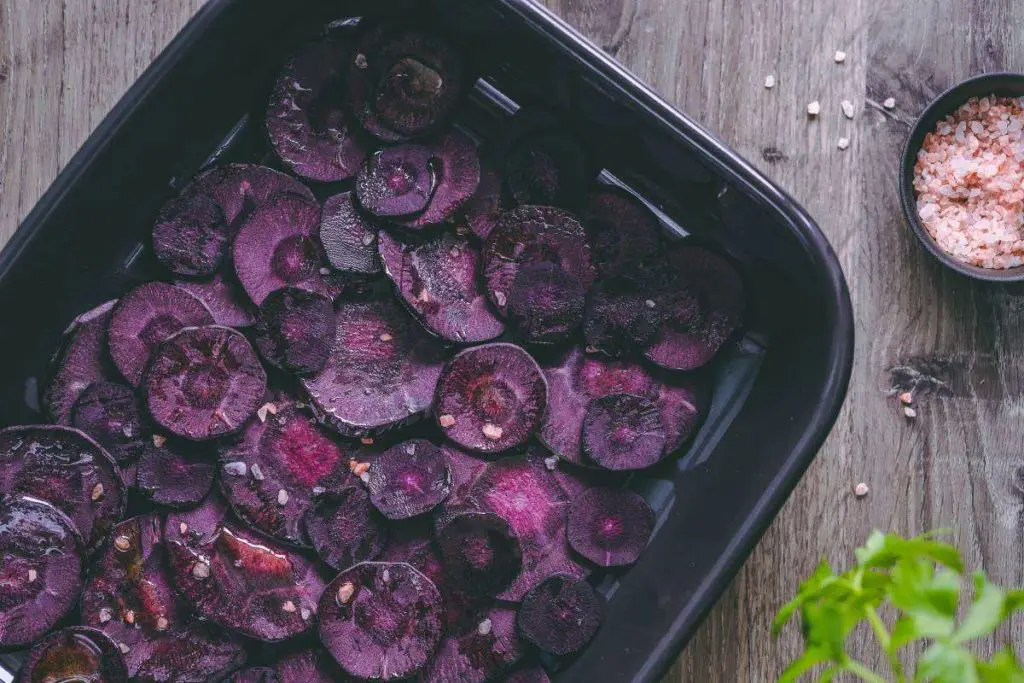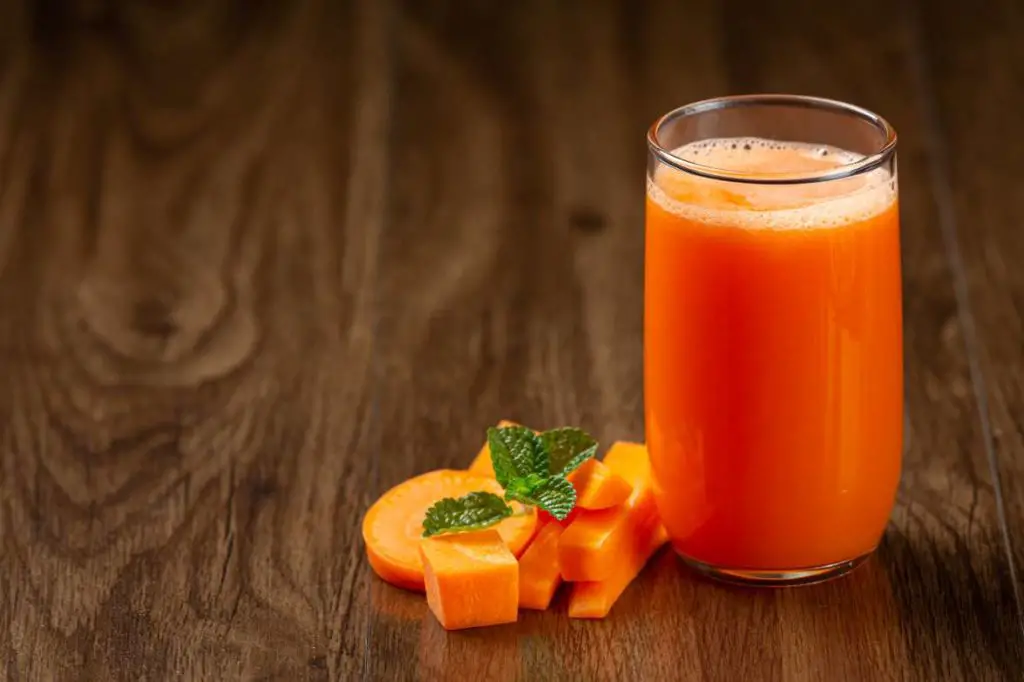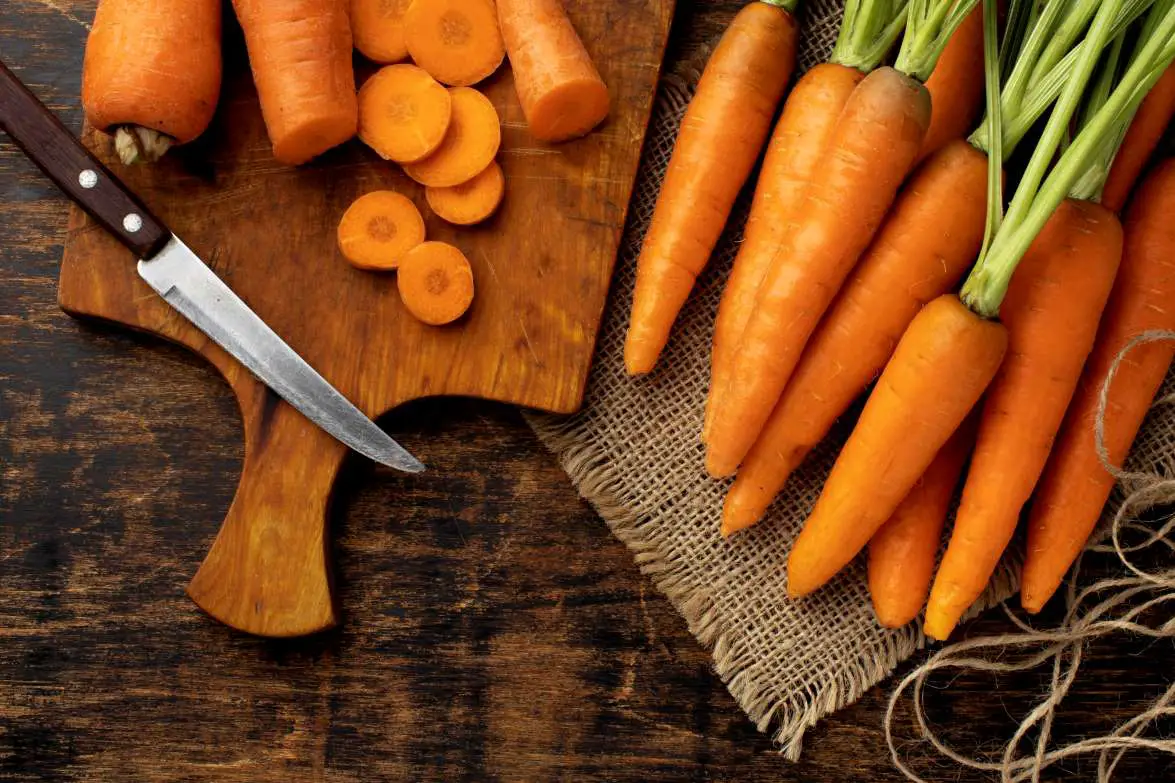Bunnies love carrots and many humans do too! But is it safe for you to enjoy them with histamine intolerance? Are carrots low in histamine?
For decades, we have heard a lot about the importance of eating vegetables and not enough people are getting the message. According to the Centers for Disease Control and Prevention, only about 10% of the American population gets enough fruits and vegetables daily (at least 5 servings per day). That means 9 out of 10 are falling short. (1)
Only plant-based foods contain significant fiber and if you aren’t eating some fruits and vegetables or other plant-based foods, you’re probably not get enough fiber either. The average person consumes around half of the recommended amount of fiber.(2) That’s a serious fiber shortfall!
Fortunately, there are many low-histamine vegetables you can enjoy on a low-histamine diet, but there are exceptions. However, you’re a little different than someone else with histamine intolerance, and you may have other food sensitivities and intolerances that make even a low-histamine vegetable hard for you to enjoy.
Now, let’s explore the question: are carrots low in histamine?
Carrots, Histamine, and Histamine Intolerance
If you love carrots, you’re in luck. This crunchy, orange veggie is low in histamine, one type of biogenic amine that can trigger histamine intolerance symptoms.
Another consideration is whether carrots contain other biogenic amines that can also trigger histamine sensitivity symptoms. Some of the most common biogenic amines from food sources include agmatine, spermidine, spermine, cadaverine, and putrescine.
Fortunately, carrots do not appear high in biogenic amines, meaning it’s unlikely they’ll increase your body’s histamine burden or worsen histamine intolerance symptoms.
The most common biogenic amine in fresh vegetables is putrescine, a mildly toxic amine that occurs in small amounts in all living things. (3)
Some studies find that storing vegetables, including carrots, for periods of time leads to higher levels of biogenic amines, including putrescine. So, don’t buy carrots, toss them in the crisper, and forget about them.
If you have histamine intolerance, use them within a day or two after purchasing them and look for the freshest ones at the supermarket.
If you can’t use carrots quickly, it’s safer to buy frozen carrots. Manufacturers of frozen vegetables, freeze their veggies right after harvest, before bacteria can accumulate on carrots and produce biogenic amines.
Freezing carrots prevents biogenic amine producing bacteria from building up and producing biogenic amines like putrescine.
Are Carrots Low in Histamine: Does How You Cook Them Matter?
Another interesting question is how cooking affects the histamine content of vegetables, including carrots. One study found that grilled and fried vegetables have higher levels of histamine than raw vegetables. (4) So, it’s best to avoid these cooking methods if you want the lowest histamine carrot dish possible.
You may have encountered sources who say that boiling reduces the histamine content of vegetables. At least in this study, boiling either had no effect on the histamine content of vegetables or slightly reduced it. (4)
Another thing to know about histamine and carrots is that you shouldn’t save carrots in the refrigerator as leftovers to eat later. As a general rule with histamine intolerance, the fresher the food, the safer it is.
When you save foods for later, bacteria that produce biogenic amines will increase. So, low-histamine foods as leftovers could trigger histamine intolerance symptoms.

Enjoy the Nutritional Benefits of Low-Histamine Carrots
Carrots are a nutritional powerhouse. Being a root vegetable, you’re probably most familiar with the orange variety of carrot, known for being high in beta-carotene, an anti-inflammatory nutrient and precursor to vitamin A. (6) Beta-carotene is linked with heart, eye and immune health. (7)
Carrots are available in other colors including purple, red, white, and yellow shades. No matter their color, carrots are not known to be high in histamine or other biogenic amines.
Purple carrots have an additional health perk, though. They contain other anti-inflammatory compounds called anthocyanins linked with heart and blood vessel health. (8)
Beyond beta-carotene, carrots are a good source of vitamin C, an antioxidant vitamin, potassium, and folate for producing healthy red blood cells. Folate also plays a key role in replication of DNA, the genetic material inside cells.
Carrots are also an excellent source of fiber for a healthy gut microbiome. Carrots contain polysaccharides (a type of carbohydrate) with prebiotic properties. Prebiotics supply food for healthy gut bacteria that make-up your gut microbiome. (5) So, the prebiotics in carrots helps support gut health.
Can Carrots Reduce Your Body’s Histamine Burden?
Carrots contain bioactive compounds called polyacetylenes (9) that block the release of histamine. Studies show that carrots that contain less soluble sugar contain more polyacetylenes and potentially more histamine blocking activity.
A study found that polyacetylenes in purple carrots reduced the expression of inflammatory proteins in macrophage and endothelial cells. (10)
However, there’s no proof that polyacetylenes lower histamine in humans. It’s an area that needs more research but an intriguing one!
On the plus side, carrots are a rich source of antioxidants and compounds with anti-inflammatory activity, including flavonoids, carotenoids (like beta-carotene), and phenols.
Plus, they contain vitamin C, another antioxidant vitamin. The anti-inflammatory properties of carrots should be positive if you’re trying to reduce the negative effects of histamine on your body.
One of the smartest things you can do, beyond eating low-histamine foods, is to add more anti-inflammatory foods to your plate, and carrots is one such food. If you want to boost the antioxidant and anti-inflammatory benefits of carrots even more, cook them.
Researchers at the University of Arkansas carried out a study that cooked and pureed carrots are higher in antioxidants than raw ones. (11) Retaining the peels boosted the antioxidant content even more. Plus, you get more fiber if you don’t remove the outer layer of the carrot.
Studies also show you’ll absorb more beta-carotene (an antioxidant) from carrots if you consume them with a source of fat, like olive oil. So, for the most anti-inflammatory benefits:
- Wash thoroughly but don’t peel carrots.
- Cook or puree them.
- Eat them with a source of healthy fat, like olive oil.
Is Carrot Juice Low in Histamine?
Are carrots low in histamine! Yes, but what about carrot juice? If you enjoy a delicious cup of fresh-squeezed carrot juice (I know I do), are you still getting the benefits of a nutrient-rich beverage that’s low in biogenic amines?
Carrot juice is low in histamine, but carrot juice contains little or no fiber. Therefore, carrot juice will cause a more pronounced rise in blood sugar than eating whole carrots will. That’s something to keep in mind if you are diabetic or prediabetic.

The Bottom Line
Are carrots low in histamine? They are naturally low in histamine and other biogenic amines. Here are some guidelines for eating carrots if you have histamine intolerance:
- Don’t store fresh carrots for more than a day or two. Use them quickly.
- If you can’t use carrots fast enough, buy frozen carrots.
- Don’t eat carrots or any other foods as leftovers. Bacterial production of biogenic amines increases during storage.
- Add a source of fat to carrots (extra-virgin olive oil is a good choice) to increase absorption of beta-carotene.
Enjoy low-histamine carrots in moderation, and eat more carrots, rather than drinking carrot juice. Although carrot juice is a nutritious beverage, it won’t help you meet your fiber requirements, and it will cause a more significant rise in blood sugar that it’s best to avoid.
Now, find out whether it’s safe to put salt on your carrots. Also, discover whether green beans or yams are high in histamine.
References:
- “Only 1 in 10 Adults Get Enough Fruits or Vegetables ….” 16 Feb. 2021, https://www.cdc.gov/nccdphp/dnpao/division-information/media-tools/adults-fruits-vegetables.html.
- “Dietary Fiber Intake of the U.S. Population.” https://www.ars.usda.gov/ARSUserFiles/80400530/pdf/DBrief/12_fiber_intake_0910.pdf.
- Sánchez-Pérez S, Comas-Basté O, Rabell-González J, Veciana-Nogués M, Latorre-Moratalla M, Vidal-Carou M. Biogenic Amines in Plant-Origin Foods: Are They Frequently Underestimated in Low-Histamine Diets? Foods. 2018;7(12):205. doi:10.3390/foods7120205.
- Chung BY, Park SY, Byun YS, et al. Effect of Different Cooking Methods on Histamine Levels in Selected Foods. Annals of Dermatology. 2017;29(6):706. doi:10.5021/ad.2017.29.6.706
- ”Carrot extract modulates microbiome and protects against ….” 29 Jun. 2020, https://www.nutraingredients.com/Article/2020/06/29/Carrot-extract-modulates-microbiome-and-protects-against-leaky-gut-study-suggests.
- Anti-inflammatory Activity of β-Carotene, Lycopene and Tri-n-butylborane, a Scavenger of Reactive Oxygen Species. In Vivo. 2018;32(2). doi:10.21873/invivo.11232
- Johra FT, Bepari AK, Bristy AT, Reza HM. A Mechanistic Review of β-Carotene, Lutein, and Zeaxanthin in Eye Health and Disease. Antioxidants (Basel). 2020 Oct 26;9(11):1046. doi: 10.3390/antiox9111046. PMID: 33114699; PMCID: PMC7692753.
- Iorizzo M, Curaba J, Pottorff M, Ferruzzi MG, Simon P, Cavagnaro PF. Carrot Anthocyanins Genetics and Genomics: Status and Perspectives to Improve Its Application for the Food Colorant Industry. Genes. 2020;11(8):906. doi:10.3390/genes11080906.
- Fitoterapia. Volume 106, October 2015, Pages 92-109.
- Dawid C, Dunemann F, Schwab W, Nothnagel T, Hofmann T. Bioactive C₁₇-Polyacetylenes in Carrots (Daucus carota L.): Current Knowledge and Future Perspectives. J Agric Food Chem. 2015.
- “Cook Your Carrots for More Antioxidants, University of Arkansas Researchers Say”. News.Uark.Edu, 2023, https://news.uark.edu/articles/9483/cook-your-carrots-for-more-antioxidants-university-of-arkansas-researchers-say. Accessed 28 Jun 2023.

